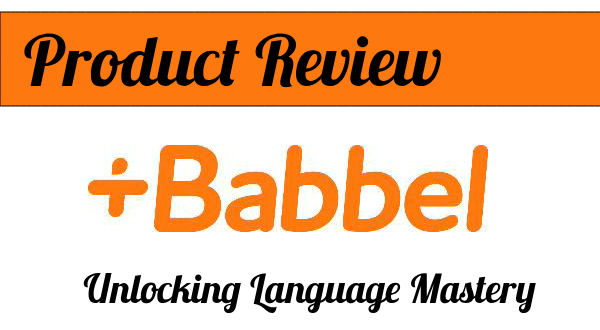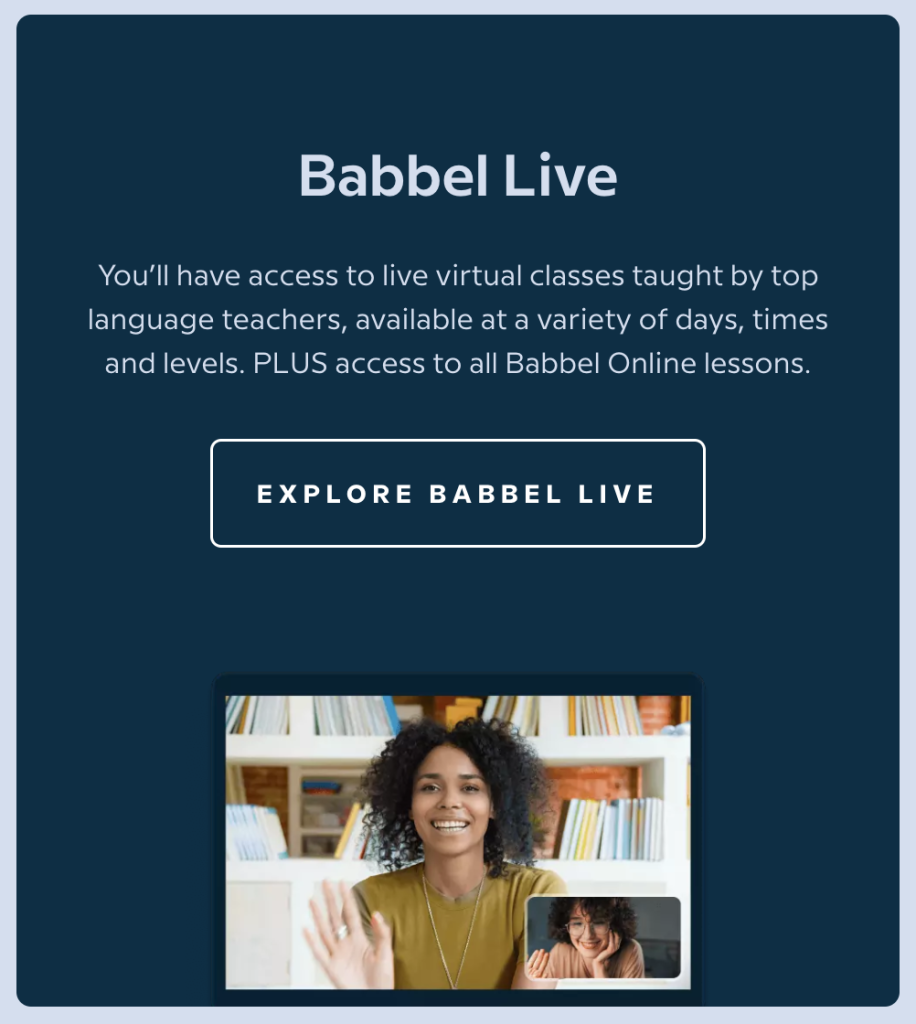Last update November 19, 2023.
Do you get FOMO when choosing language learning apps? I do.
Every time I start learning a new language I think to myself “Which app will I use?”.
Every time I start a new language, I research which app to use for that language, and of course Babbel is often in contention.
So why might you choose Babbel?
Babbel always feels like the ‘serious’ choice as a language learning app. As a serial language learner, I often feel like I should choose it.
While not the prettiest app, Babbel claims to have a ‘world-class didactic method’ at its core.
So what does that mean, why you should care, and what does Babbel offers the language learner?
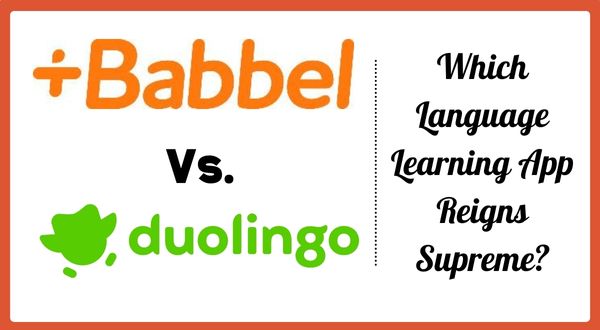
Wonder how Babbel stacks up against Duolingo?
- What Is The Babbel App?
- Is Babbel Good To Learn A Language?
- How Much Does Babbel Cost?
- Is Babbel Worth It?
- Conclusion
What Is The Babbel App?
Babbel Review at a glance:
The Babbel app (and website) is a language learning platform with lessons to take you “from beginner to advanced”.
| Feature | Description |
|---|---|
| Languages Offered (for English speakers) | Danish, Dutch, French, German, Indonesian, Italian, Norwegian, Polish, Portuguese, Russian, Spanish, Swedish, Turkish |
| User Interface | Clean, modern, and user-friendly. |
| Lesson Content | Organized into short lessons that focus on practical, real-life scenarios. |
| Types of Exercises | Vocabulary, pronunciation, speaking, and listening exercises. |
| Progress Tracking | Clear progress indicators, including a visual dashboard. |
| Personalisation | Onboarding with a generalised questionaire to provide exercises that the learner might find more relevant. Personalized review sessions and adaptive learning algorithms. |
| Pronunciation Support | Pronunciation feedback and voice recognition in lessons, but is not very accurate in the answers it accepts. |
| Offline Access | Available for download, enabling offline learning. |
| Cultural Insights | Cultural and contextual tips are included in lessons. Babbel Magazine has more specific articles on the culture of the language you are learning. |
| Customer Support | Responsive customer support available in app or on website. |
| Price & Subscription | 7 day free trial. Subscription-based pricing with various plans and pricing tiers. |
| Available Platforms | Android, iPhone and Web Browsers |
Is Babbel Good To Learn A Language?
Babbel has taken a great deal of effort to present an effective and interesting language learning experience. The depth and variety of their activities make it a good app to use for language learning when you are in the beginning and lower intermediate stages.
Babbel has a number of key features to speed your language learning experience.
To begin, they use real people speaking in Babbel lessons. This helps make the learning experience genuine and promotes cultural understanding.
They use reasearch-backed methods to help your brain remember new words for a long time, moving the acquired language through different memory stages.
In the same way, they present different ways to learn, like lessons on the app, live online classes, games, videos, podcasts, and more. This caters to various ways people like to learn.
Babbel takes the approach that language isn’t just about words. It also includes culture, history, people, and places.
Babbel’s Teaching Method In Review
Babbel uses a ‘didactic approach‘ as it’s language teaching method.
The didactic approach is designed to be holistic, integrating contemporary theories of learning and teaching.
Consequently, the learner is given opportunities to learn a broad base of language skills.
Babbel integrates activites in reading, writing, listening and speaking to teach both vocabulary and grammar. The activities are designed to be lifelike and practical, teaching through dialogue.
It also has the option to be picky about including accents over letters when you are answering, or to turn it off and not worry about them.
Personally I think they are important to learn if you want to write in the language well, but you may have reasons to turn them off.
There are also specific courses on grammar that you can choose to complete.
It also has speech recognition technology, to help check your pronunciation, and the ability to review past lessons at will.
Babbel Language List
Babbel has presently has courses across 13 languages for English speakers.
There are 13,000 hours of content and more than 50,000 lessons across those 13 languages.
Each language has a different number of courses available. As you can see, some of them are quite substantial… others, not so much. But the subscription is the same, regardless of language.
| Danish | Newcomer – 3 courses Beginner I – 4 courses Beginner II – 1 course Grammar – 2 courses Pronunciation – 4 courses Countries and Traditions – 3 courses Specials – 2 courses Words and Sentences – 19 courses TOTAL – 38 COURSES | Polish | Newcomer – 2 courses Beginner I – 7 courses Beginner II – 6 courses Grammar – 9 courses Countries and Traditions – 3 courses Specials – 8 courses Words and Sentences – 19 courses TOTAL – 54 COURSES |
| Dutch | Newcomer – 3 courses Beginner I – 4 courses Beginner II – 4 courses Pre-intermediate – 2 courses Grammar – 5 courses Listening and Speaking – 3 courses Countries and Traditions – 4 courses Specials – 3 courses Words and Sentences – 19 courses TOTAL – 47 COURSES | Portuguese | Newcomer – 2 courses Beginner I – 3 courses Beginner II – 3 courses Pre-intermediate – 3 courses Intermediate – 2 courses Refresher – 1 course Grammar – 5 courses Countries and Traditions – 3 courses Specials – 5 courses Words and Sentences – 31 courses TOTAL – 58 COURSES |
| French | Newcomer – 3 courses Beginner I – 4 courses Beginner II – 4 courses Pre-intermediate – 2 courses Intermediate – 4 courses Independent – 2 courses Advanced – 1 course Refresher – 2 courses Grammar – 7 courses Listening and Speaking – 6 courses Countries and Traditions – 6 courses Specials – 7 courses Words and Sentences – 31 courses TOTAL – 79 COURSES | Russian | Newcomer – 2 courses Beginner I – 8 courses Grammar – 3 courses Countries and Traditions – 4 courses Specials – 4 courses Words and Sentences – 19 courses TOTAL – 40 COURSES |
| German | Newcomer – 3 courses Beginner I – 3 courses Beginner II – 2 courses Pre-intermediate – 3 courses Intermediate – 3 courses Independent – 2 courses Refresher – 2 courses Grammar – 6 courses Listening and Speaking – 5 courses Business German – 7 courses Reading and Writing – 2 courses Countries and Traditions – 4 courses Specials – 5 courses Words and Sentences – 31 courses TOTAL – 78 COURSES | Spanish | Newcomer – 3 courses Beginner I – 3 courses Beginner II – 3 courses Pre-intermediate – 2 courses Intermediate – 4 courses Independent – 3 courses Advanced – 1 course Mexican Spanish – 6 courses Refresher – 2 courses Grammar – 6 courses Business Spanish – 5 courses Listening and Speaking – 6 courses Countries and Traditions – 5 courses Specials – 6 courses Words and Sentences – 31 courses TOTAL – 86 COURSES |
| Indonesian | Newcomer – 2 courses Beginner I – 2 courses Beginner II – 2 courses Words and Sentences – 19 courses Specials – 2 courses TOTAL – 27 COURSES | Swedish | Newcomer – 2 courses Beginner I – 4 courses Beginner II – 4 courses Pre-Intermediate – 2 courses Intermediate – 1 course Refresher – 2 courses Grammar – 4 courses Countries and Traditions – 6 courses Listening and Speaking – 4 courses Specials – 4 courses Words and Sentences – 31 courses TOTAL – 64 COURSES |
| Italian | Newcomer – 2 courses Beginner I – 4 courses Beginner II – 4 courses Pre-intermediate – 5 courses Intermediate – 5 courses Independent – 1 course Refresher – 2 courses Grammar – 8 courses Listening and Speaking – 4 courses Countries and Traditions – 5 courses Specials – 5 courses Words and Sentences – 31 courses TOTAL – 76 COURSES | Turkish | Newcomer – 2 courses Beginner I – 6 courses Beginner II – 7 courses Grammar – 11 courses Specials – 10 courses Words and Sentences – 22 courses TOTAL – 58 COURSES |
| Norwegian | Newcomer – 2 courses Beginner I – 4 courses Beginner II – 4 courses Grammar – 6 courses Countries and Traditions – 3 courses Specials – 5 courses Words and Sentences – 19 courses TOTAL – 43 COURSES |
NOTE: ‘Advanced’ means actually around B2, which is ‘Upper Intermediate’, and they do not go to that level in all languages.
French and Spanish have the most advanced courses, whereas some like Indonesian only have a couple of beginner courses.
Supplemental Material
Babbel Audio and In-App Podcasts
Babbel also offers audio materials and in-app podcasts to enhance your language learning experience.
These resources provide additional opportunities to practice listening comprehension and improve your understanding of native speakers.
With Babbel’s audio offerings, you can further immerse yourself in the language and reinforce what you’ve learned in your lessons.
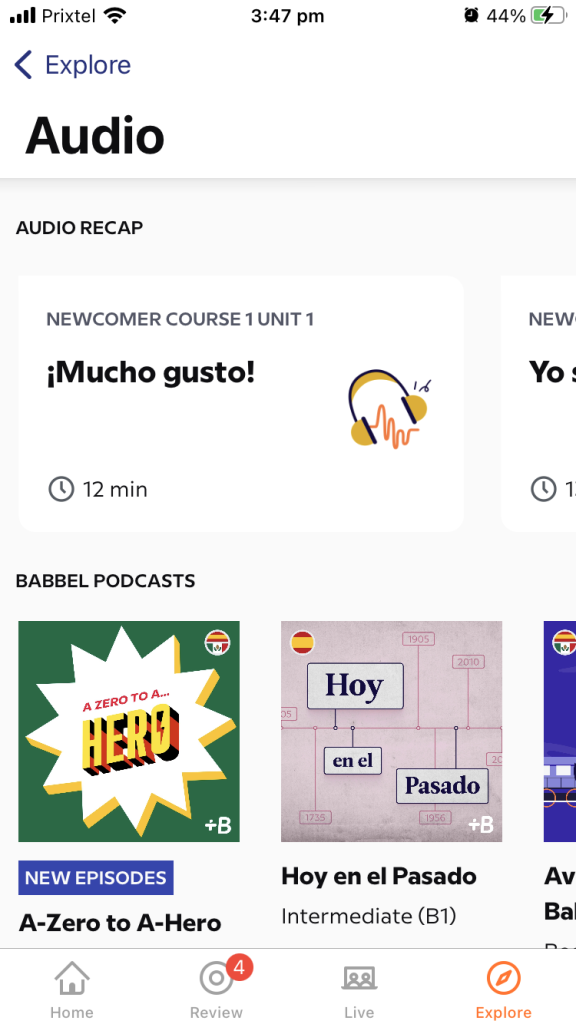
Babbel Podcasts
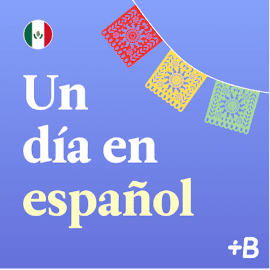
To supplement the excercises in the app, Babbel has podcasts available through Spotify, Google and Apple Podcasts.
Some are about general life, others more specifically language learning, and the levels range from beginner to advanced.
Best of all, these podcasts are available for free; you do not need to have a subscription to access them.
Babbel Games
Babbel offers language learning games designed to make the learning process enjoyable and interactive.
Focusing on different aspects of language acquisition such as vocabulary, grammar, and sentence structure, the games are tailored to the specific language being learned, ensuring relevance and effectiveness.
These games are designed to be both entertaining and educational, offering an interactive approach to language rehearsal on the Babbel platform.
The first vocab drilling game is accessible for free – the other games require a subscription.
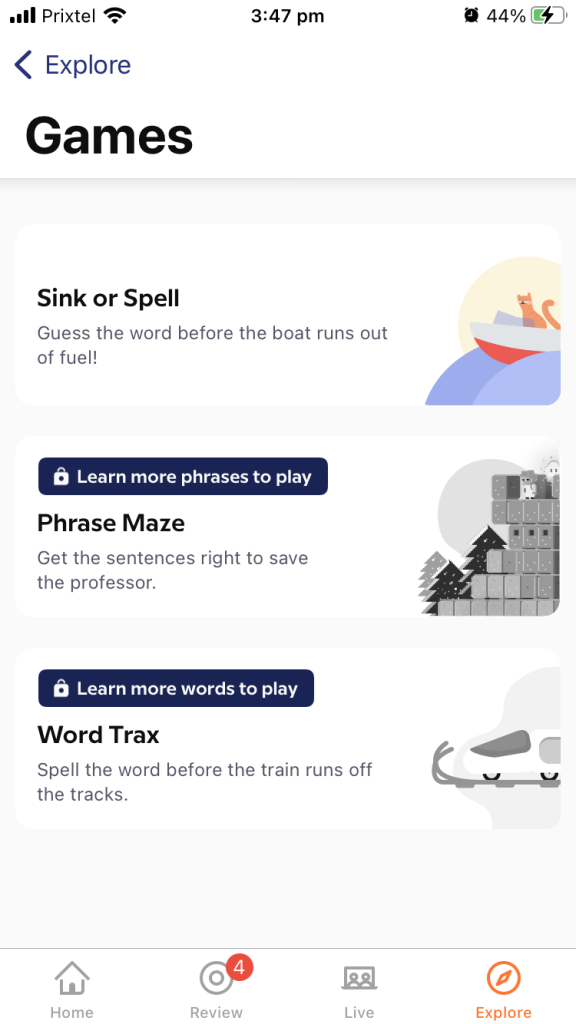
Babbel Magazine
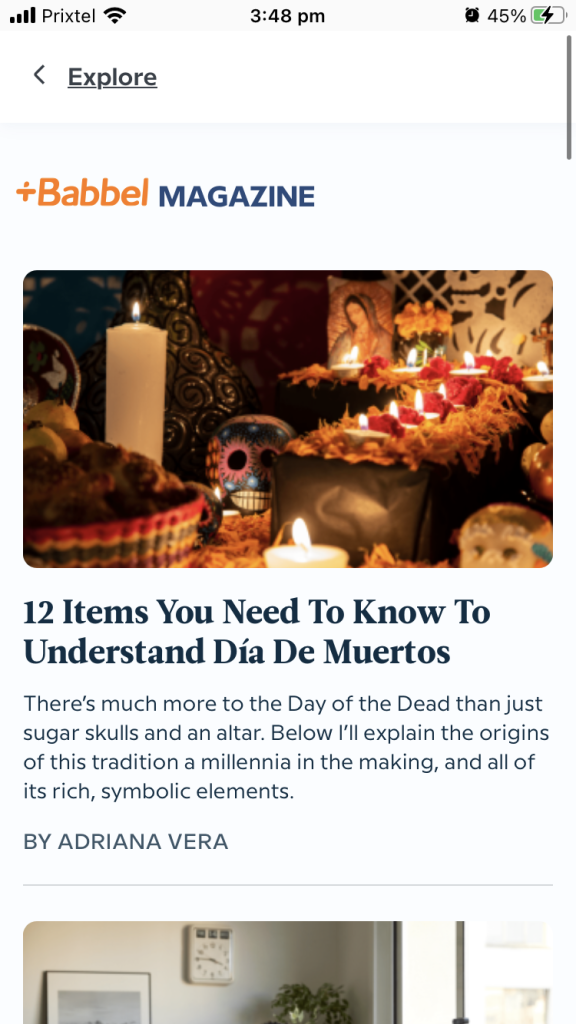
Babbel Magazine complements language learning on the Babbel platform. It provides articles, tips, and cultural insights to enhance your understanding of the language you’re learning.
The content covers a variety of everyday topics, making it engaging and relevant to learners.
The magazine aims to broaden your language skills by exposing you to real-life context and diverse subjects, helping you connect with the language in a practical and meaningful way.
Language Level FAQ
Can You Assess Your Language Level with Babbel?
One of Babbel’s advantages over some other apps is that you can assess your level of language before commencing your learning program. This way, rather than starting from the very beginning, you can be placed at appropriate level.
Can You Start Learning As A False Beginner with Babbel?
There is no need to start from scratch, as most other apps, like Duolingo, force you to do. This is great if you are a ‘false beginner’, or if you have been learning with some other app and decide to make the change.
One of the downsides of many apps is that you are forced to start learning from scratch, with the assumption that you are a brand new language learner.
Because they test your language level as you onboard to your language, Babbel has the advantage here.
Can Babbel App Get You To B2?
I give a qualified ‘Yes’ to those who ask if you can reach a B2 level with Babbel. In Babbel Spanish and French languages in particular, you can probably achieve a B2 level with the complete offering within the Babbel platform.
This is because French and Spanish offer the most substantial number and depth of language courses. They are the only languages to offer ‘advanced’ vocabulary courses (which in this case means a B2 level).
For German and Italian it might also be possible, due to the amount of material on the app.
Reaching a B2 level in the other languages offered with Babbel alone will be more difficult.
However, learning vocabulary at a B2 level, and achieving a well-rounded B2 level of language are two different things.
In order to round out your language skills, make the most of all the supplements and undertake your own learning activities. Taking notes, and printing and processing the grammar points is a good start.
Reading the Babbel Magazine articles, playing the games, regularly reviewing the vocabulary of all levels.
Also, regularly ‘shadowing’ the audio, speaking it at the same time and listening to your pronunciation, is a good idea to improve your spoken fluency.
It is important to recognise the limitations of using just one resource for learning a language. Nevertheless, if you activate all parts of the app, Babbel can probably get you B2.
For other languages, you will need other resources.
Can You Reach C1 or C2 with Babbel?
Yes, Babbel delivers material to C1 for French, Spanish, German and Italian, by enrolling in Babbel Live classes.
No you will not reach a C2 level with Babbel, either the app or the live classes.
Simply using the Babbel app is not going to cover material at either of these levels
Will I become fluent with Babbel?
Fluency is a tricky concept to talk about, with people disagreeing what ‘fluency’ truly is.
As I have said, there is sufficient material in the app alone to cover up to B2 in French and Spanish. And with the live classes, it is possible to considerably develop your language skills.
How ‘fluent’ you become will depend upon how much you exercise your skills – fluency can be related to how ‘fluidly’ you can elicit, or absorb, the language in its different forms.
You may understand the vocabulary you are reading, but it takes time to train your brain to connect the words in a fluent fashion.
If you do not only absorb the new vocabulary, but practise expressing in written and oral form, and practise your passive skills, you can become fluent in any of the languages to the level of vocabulary and grammar that you learn.
Is Babbel Effective?
Babbel app is effective at what it is designed as: a spaced repetition system app delivering vocabulary and grammar points, with added audio and other features.
While it does test pronunciation, this is a minor part of the learning activities.
What Are The Disadvantages Of Babbel?
One of the weaknesses of apps generally is that they are often a more passive style of learning.
Consequently, the learner can become quite good at recognising language when they see it, or hear it, but can still be weak on generating language to speak or write.
It also can feel a bit … well, repetitive, and dare I say, even boring. But maybe that is just because so many apps are so gamified, that I have become used to being entertained a little.
So, does that make the Babbel app good for learning a language?
It certainly has had a lot of thought put into it, and I have a lot of confidence in it as a serious educational aid.
Naturally, it goes without saying that the Babbel app alone is not a complete language learning resource.
In order to build active language skills, I strongly suggest you either invest in the Babbel Live program, or find some other way to develop your active conversational skills.
It doesn’t matter if that is formal lessons, with another provider such as iTalki, or if it is a local language exchange, expat group, or target language meetup.
If you work your way through each of the units, particularly if you take your own notes, verbally shadow the oral exercises, and generally take initiative and responsibility for your learning – yes, the Babbel app can be an effective aid for learning a language.
How Much Does Babbel Cost?
Babbel has a number of different packages available, at a range of price points.
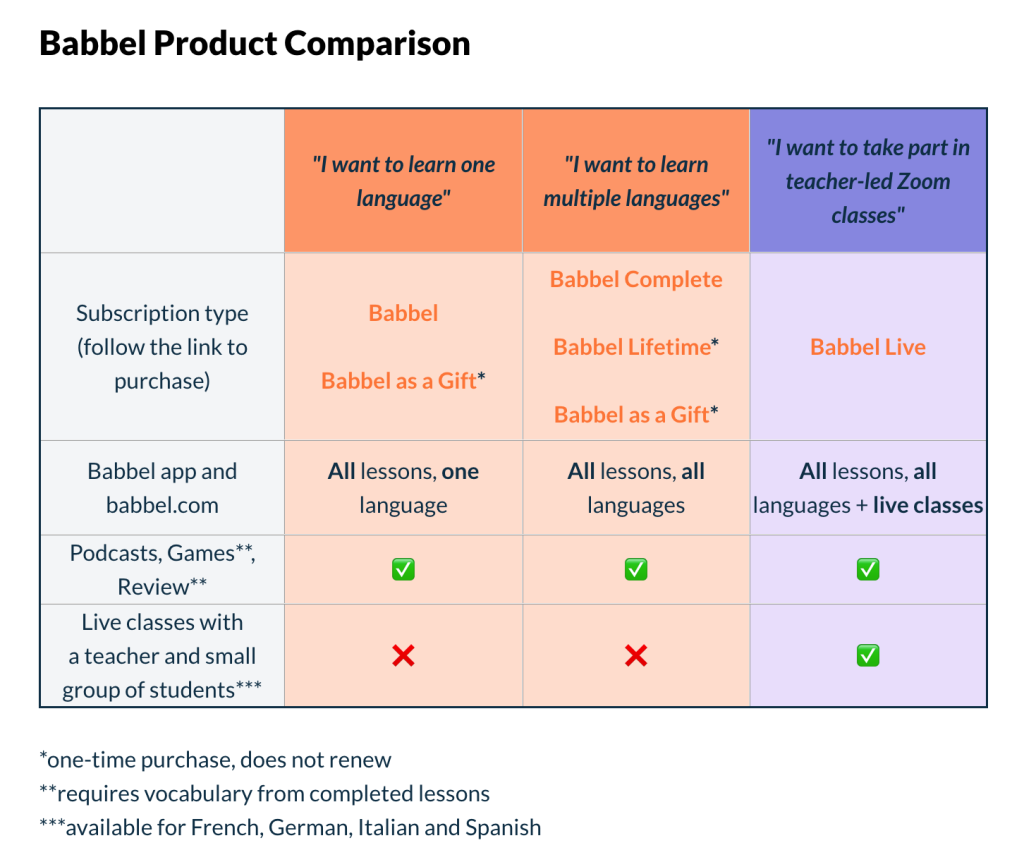
Is Babbel Free To Use?
Babbel is generally not free to use.
When you sign up, you can access the first lesson for free, but then you must subscribe to use the rest of the lessons.
However, it is giftable as a once off 6, 12 or 24 month package – so you might be able to convince your rich uncle to buy it for you 🙂
Also, many employers and schools have organisational licences for Babbel, so it is worth checking to see if you are able to access the courses that way.
Does Babbel Have A Free Trial?
Yes, the first lesson in all languages is accessible for free.
If you sign up on the website, there is no need to enter your credit card information.
If you open an account on your smartphone, you will have to sign up for a subscription with a 7 day free trial.
However, you can immediately go into your subscription centre, and cancel it, and still have access to the trial lessons.
What Subscription Options Are There With Babbel?
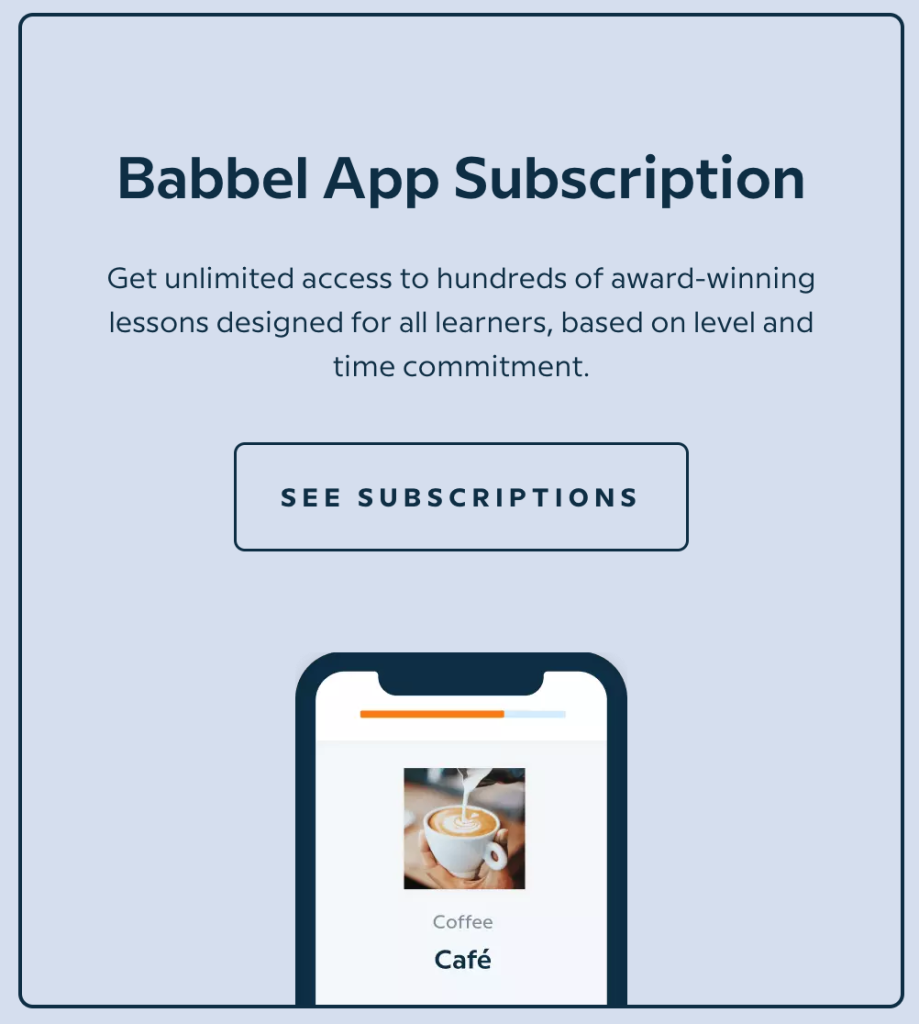
Babbel has six subscription options:
- 1 month
- 3 months
- 6 months
- 12 months
- 12 months Complete (with all languages)
- Lifetime access to all languages.
How Much Is The Cost Of A Babbel Subscription Per Month?
Babbel Prices According to Region
This table shows the cost of Babbel packages according to regional currencies, including the calculation of how much Babbel is per month.
| Length of Subscript’n | 1 Month | 3 Months | 6 Months | 12 Months | 12 Months Complete* | Lifetime* |
|---|---|---|---|---|---|---|
| USA PRICE | $14.95 | $37.95 | $66.90 | $89.40 | $129.00 | $349.00 |
| (USD/mth) | ($14.95) | ($12.65) | ($11.15) | ($7.45) | ($10.75) | |
| UK PRICE | £12.99 | £32.97 | £47.94 | £65.88 | £264.99 | |
| (GBP/mth) | (£12.99) | (£10.99) | (£7.99) | (£5.49) | ||
| EUROPE PRICE | €16.99 | €38.97 | €59.94 | €83.88 | €299.99 | |
| (EUR/mth) | (€16.99) | (€12.99) | (€9.99) | (€6.99) | ||
| AUSTRALIA PRICE | $19.99 | $44.97 | $77.94 | $119.88 | $449.99 | |
| (AUD/mth) | ($19.99) | ($14.99) | ($12.99) | ($9.99) |
*access to all languages
It is worth noting, these packages offer subscription per language course. Babbel packages are predominantly for access to ONE LANGUAGE.
If you want to access a different language, you can either pay for another language subscription, or purchase a yearly subscription to Babbel Complete or a Babbel Lifetime subscription.
What Is The ‘Babbel Complete’ Subscription?
Babbel Complete Subscription allows you to access all the languages offered by Babbel. Yearly subscription is AU$139.95 / US$129.00 / UK£264.99 / EU€299.99 (payable in advance).
What Is The ‘Babbel Lifetime’ Deal?
Babbel offers access to every language on the Babbel platform, for a single lifetime membership cost of AU$449.99/US$349.
If you just love Babbel, and want to learn at least 3 of the languages that they offer, or subscribe to the app for more than 2 years, this is going to be worth considering.
(You may have heard in 2020 that Babbel was offering discounted lifetime subscriptions at the start of the coronavirus pandemic. At the time of last edit this deal is still apparently accessible for new users to purchase a lifetime subscription to Babble from StackSocial for US$149.97.
(NOTE: I have not been able to verify how this StackSocial purchase is transferred across to the app – so I have to say for the deal from StackSocial BUYER BEWARE.) )
What is Babbel Live?
Babbel Live is a separate subscription program for Spanish, French, German or Italian that includes live classes in your target language, in addition to use of the app courses.
Classes are unlimited for the period of subscription, in 1 month, 3 month, 6 month and 12 month packages, like the app subscriptions.
Classes are limited to just 6 people, and you can choose the topic, level of class and time from an extensive schedule.
Usage of the app is free for those who have purchased a Babbel Live package.
Does Babbel Have A Money-Back Guarantee?
Yes, Babbel has a 20 day Money Back Guarantee for all of their packages. Just write to customer service to organise the refund.
Is Babbel Worth It?
To assess whether Babbel is a worthwhile language learning platform, it’s essential to consider:
- if the features are what you are looking for, and
- if the price is right.
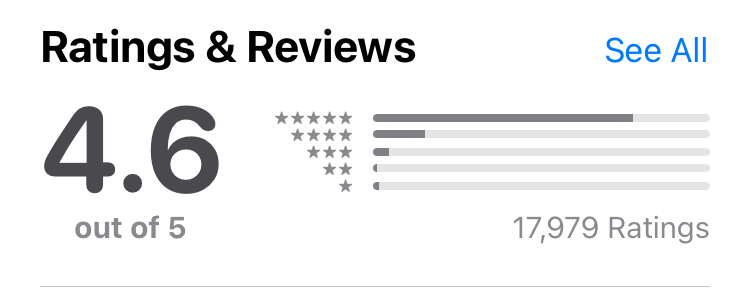
Reviews at the Apple App Store have it rated as 4.6/5. The vast majority of negative review are because Babbel only has a limited number of languages, or because people want a free app.
So Is It Worth Paying For Babbel?
If you are serious about your language learning, and the Babbel platform catches your interest, then yes, it could be well worth paying for Babbel.
Particularly if you are a serial language learner, or like to have a couple of languages on the go, the lifetime package is an incredibly cost effective way to learn!
Babbel is not the cheapest option out there for language learning, but sometimes cheapest is not the most economical.
For most learners who are only wanting access to one language, at least at any one point in time, Babbel is twice the price of Duolingo if you pay monthly.
But it does have the added flexibility of language level testing, ease of moving between courses within the language, and a more lifelike style of learning.
Conclusion
So there you have it… my Babbel Review for 2023.
So, did I choose to use it for Spanish? Well… no. I went back to Memrise, which is largely free, but for which I had an annual subscription anyway.
Memrise doesn’t have the podcasts, nor the live classes, but most of the other features it does.
And while it may not be quite as rigorous as Babbel, I do not depend on my tools to be rigorous – I do that myself.
Nevertheless, everytime I look at Babbel, I am impressed with the effort they put in to make it a great quality product.
Cate is a language enthusiast sharing her language learning journey here. Apart from her native English (albeit 'Strine'*!), as an adult she has also learned Auslan (Australian Sign Language) to approximately a C1 level, Dutch to around B1/2, French to around A2, and has a smattering of other languages.
B.A. (Anthropology/Marketing), Grad. Dip. Arts (Linguistics), Grad. Cert. Entrepreneurship & Venture Development, (CELTA).
Auslan Interpreter (NAATI), and general Language Nut.
*For more information on 'Strine', visit https://en.wikipedia.org/wiki/Strine

